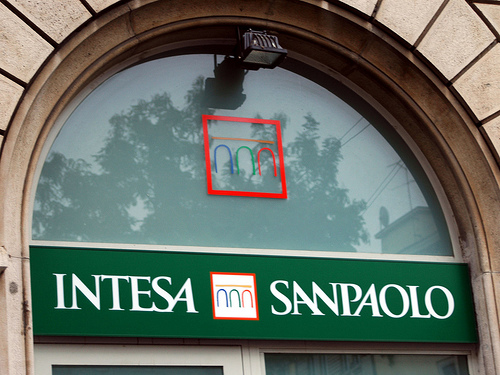Italy's largest bank Intesa Sanpaolo has completed its first proprietary investment in bitcoin, buying €1 million worth of the cryptocurrency as part of what the bank’s chief executive described as a “test.”
The move, first reported by Italian daily newspaper La Stampa, saw the bank purchase 11 bitcoins on 13 January and marks the first time an Italian bank has directly purchased a cryptocurrency.
The news was first leaked through a screenshot of email exchanges between some of the Italian bank's employees - including Niccolò Bardoscia, head of digital assets trading and investments - on 4Chan, an image-based bulletin board where anyone can post comments and share images anonymously.
The transaction was later confirmed by the bank to Reuters and other news organisations.
The bitcoin transaction was executed through Boerse Stuttgart Digital's institutional trading infrastructure, the German company said.
Intesa SanPaolo didn’t disclose further detail about the transaction or its strategy that led to the deal.
After an event in Milan organised by Intesa San Paolo and General Confederation of Italian Industry also known as Confindustria, chief executive Carlo Messina said that the transaction was “a test” and that the bank doesn’t intend to become a bitcoin player.
Messina told reporters after the event: "As a wealth management company that has the ambition to become like UBS, we have very sophisticated clients that may ask for this kind of investment, and you can't serve them unless you have a presence".
Messina explained the bank tested how to handle potential requests from clients but added that there are still limitations, with clients having to demonstrate that they understand the potential risks.
The event saw the General Confederation of Italian Industry also known as Confindustria and Intesa Sanpaolo announcing a €200 billion 3-year initiative focused on new investments for SME growth.
At the event, Messina also warned non-professional investors against venturing into cryptocurrencies. “Don't do it,” he said.
Messina's words echo those of the trade association for Italian banks Associazione Bancaria Italiana, which in July last year highlighted the risks of crypto.
“Unsecured crypto-assets, such as bitcoin and ethereum, are not, as a rule, issued by any operator, lack intrinsic value and do not generate income streams such as coupons or dividends. There is no entity or real or financial activity that ensures their value,” said the organisation’s managing director Fabio Panetta.
He added: “They are sometimes traded on informal and opaque circuits or on platforms that are not subject to adequate controls”.
Bitcoin has registered a growth in value over the past few months, reaching a peak of $100,000 for the first time after the announcement of Paul Atkins' appointment as chairman of the US Securities and Exchange Commission (SEC) in December.
Bitcoin's hopes for growth are further supported by Trump's recent re-election, with the president-elect promising in July at the Bitcoin 2024 conference in Nashville that he would adopt less stringent cryptocurrency policies if he won the 2024 election.
There, he expressed his vision of creating a favourable environment for cryptocurrency investment, promising to make the US ‘the crypto capital of the planet’.
Latest News
-
Gemini to cut quarter of workforce and exit UK, EU and Australia as crypto slump forces retrenchment
-
Bank ABC’s mobile-only ila bank migrates to core banking platform
-
Visa launches platform to accelerate small business growth in US
-
NatWest to expand Accelerator programme to 50,000 members in 2026
-
BBVA joins European stablecoin coalition
-
eToro partners with Amundi to launch equity portfolio with exposure to ‘megatrends’
Creating value together: Strategic partnerships in the age of GCCs
As Global Capability Centres reshape the financial services landscape, one question stands out: how do leading banks balance in-house innovation with strategic partnerships to drive real transformation?
Data trust in the AI era: Building customer confidence through responsible banking
In the second episode of FStech’s three-part video podcast series sponsored by HCLTech, Sudip Lahiri, Executive Vice President & Head of Financial Services for Europe & UKI at HCLTech examines the critical relationship between data trust, transparency, and responsible AI implementation in financial services.
Banking's GenAI evolution: Beyond the hype, building the future
In the first episode of a three-part video podcast series sponsored by HCLTech, Sudip Lahiri, Executive Vice President & Head of Financial Services for Europe & UKI at HCLTech explores how financial institutions can navigate the transformative potential of Generative AI while building lasting foundations for innovation.
Beyond compliance: Building unshakeable operational resilience in financial services
In today's rapidly evolving financial landscape, operational resilience has become a critical focus for institutions worldwide. As regulatory requirements grow more complex and cyber threats, particularly ransomware, become increasingly sophisticated, financial services providers must adapt and strengthen their defences. The intersection of compliance, technology, and security presents both challenges and opportunities.
© 2019 Perspective Publishing Privacy & Cookies














Recent Stories